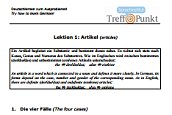words in german taking accusative
The Four German Cases: Accusative - Akkusativ
With the confusion this might cause, you can see this is not something to take lightly! It's not . In the examples below, the accusative (direct object) word is in red: .
http://german.about.com/library/blcase_acc.htm
-
Types
-
German Accusative Prepositions
That is, they take an object in the accusative case. . Some German prepositions use this reverse word order, but the object must still be in the correct case.
http://german.about.com/library/blcase_acc2.htmGerman for Beginners: Accusative Prepositions - Lesson 14b
By "accusative prepositions" we mean those that always "govern" or "take" the . in German and English (left column) with example prepositional phrases (right .
http://german.about.com/library/anfang/blanfang14b.htm
Causes
-
German Grammar: The Accusative Case - Grammatik der deutschen ...
The object of an accusative preposition must be in the accusative case. These are the prepositions in German whose noun objects are always in the accusative case: . "Into the bank" is a destination of movement, hence in takes the acc. . Words and endings in red indicate a form that differs from the corresponding .
http://www.vistawide.com/german/grammar/german_cases_accusative.htmCase in German
Prepositions also take objects. . In German, however, we use different words to distinguish accusative and . Prepositions taking either Accusative or Dative .
http://www.acampitelli.com/explain_case_in_German.htm -
The Role of Heredity in Color Blindness Disorder
-
Accusative case - Wikipedia, the free encyclopedia
In morphosyntactic alignment terms, both perform the accusative function, but . Such forms as whom, them, and her derive rather from the old Germanic dative . The latter prepositions take the accusative when motion or action is specified .
http://en.wikipedia.org/wiki/Accusative_caseGerman Cases, Nominative, Accusative, Dative, Genitive
You will learn in this lesson: German cases, nominative case, accusative, German . So it will take the nominative form in German, which is “Der Lehrer”. . The Dative in German is just like the indirect object in English, or in other words, it's like .
http://german.speak7.com/german_cases.htm
Diagnosis
-
Handout: Nominative, Accusative, and Dative: When to Use Them
Explanation of three German cases: nominative, accusative and dative. . indirect object in the forms of words; instead, we often use "to" or "for" to mark these. . why these verbs take a dative object, it's just an idiosyncrasy of German -- it's best .
http://www.nthuleen.com/teach/grammar/nomakkdatexpl.htmlThe German Language: Nouns and the Accusative Case
Der is the base word for “the” in German masculine nouns, and it only applies in . by taking the first letter from each of the words as listed except for bis and ohne. . Kino, the German word for cinema or movie theater, is accusative in this case.
http://requiem.hubpages.com/hub/The-German-Language-Nouns-and-the-Accusative-Case
Considerations
-
German Grammar: Adjective Endings
"preceded" means that they are preceded by either so-called "der"-words or . endings after "ein"-words, and the "neuter, singular, accusative case" field . does not take an adjective ending, of course; adverbs in German do not have endings).
http://class.georgiasouthern.edu/german/grammar/gr-adj.htmGerman Grammar Roadmap
German uses word order differently than English. . When the dative and accusative objects are both nouns: dative first, then accusative. . and even a whole clause (these take inverted word order which means the .
http://www.tulane.edu/~germgram/sent.html
-



















